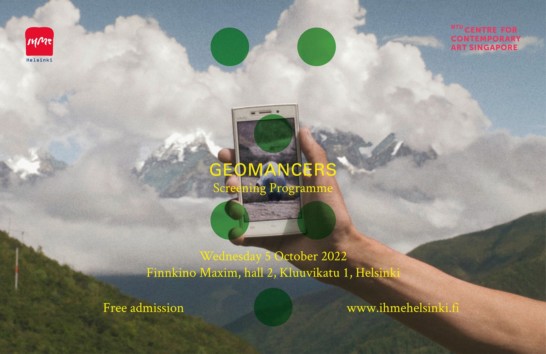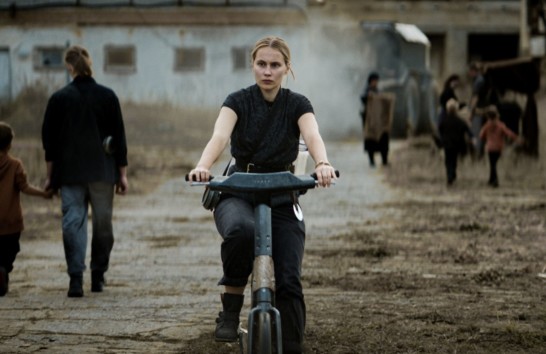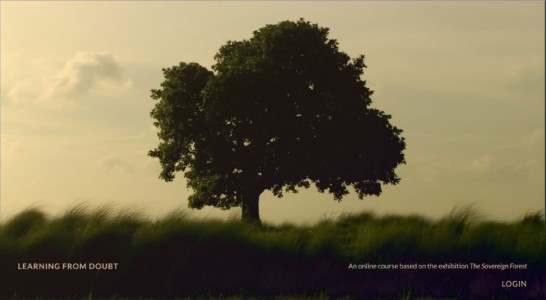Commissioned texts
Stories that Separate, Stories that Bind
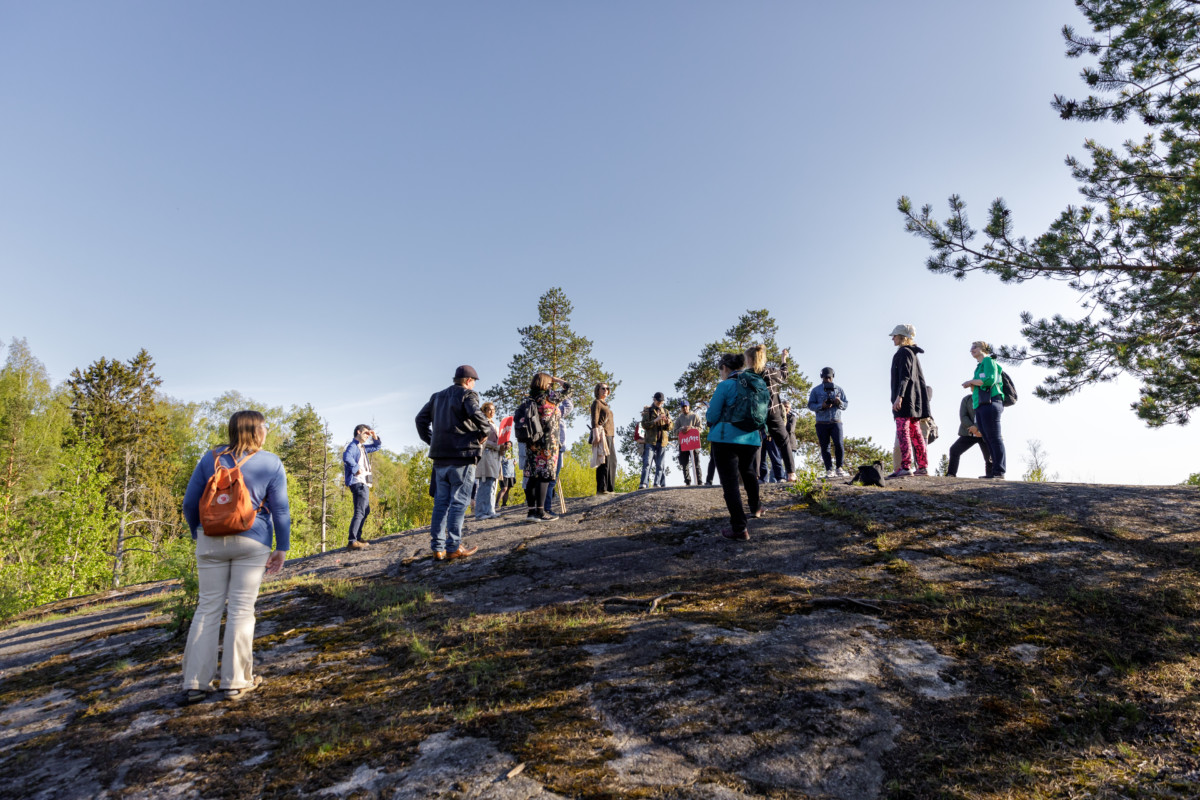
IHME Helsinki Commission 2023: Chicago Boys – While We Were Singing, They Were Dreaming
Our skins are marked by a culture of individualism and self-satisfaction, certain stories that atomize us from ourselves, and one another. While we may not always notice these stories, some people are adept at pointing them out to us.
Hiwa K’s artistic practice is in art and music, but in his work with local communities in Kurdistan, he sees himself as a nurse “with many people and many plants and many animals”. Some find this form of care strange. People may ask why Hiwa feeds a pigeon if it cannot give him anything in return. He responds that when he feeds a bird, in return it will fly:
“It doesn’t mean they have to give to exchange something.” [i]
By this, I understand Hiwa as telling a story about those care practices that are inherent within us, that are inconvenient for the neoliberal condition, but crucial for its perpetuation. In a neoliberal order, there is nothing to gain transactionally from caring except for our own humanity. Here Hiwa points to something emaciated in the stories we tell of our society. Through Chicago Boys, Hiwa is attempting to feed those emaciated stories, and help them become something new.
Lately my thoughts and practice have revolved around storytelling as “world-making”. According to Maria Puig de la Bellacasa, our “ways of studying and representing things have world-making effects”.[ii] Thus, to add with a quote from Donna Haraway, it matters very concretely “what matters we use to think other matters with; [–] what stories we tell to tell other stories with” [iii].
The stories we tell about the world and with which we tell the world shape our ways of being and of understanding things, but can also create space for new stories, new worlds. When I was invited to write this review, I intended to reflect on Chicago Boys in this context. During my reflection process, I have found Chicago Boys to be immensely helpful for navigating the stories that make care individualized, and the social worlds we are making with these precise stories. If Chicago Boys prompts participants to tell a story about a world based on values of solidarity, connectedness, and trust, what role does care have in this story?
Care as enacted
Chicago Boys: While We Were Singing, They Were Dreaming was the IHME Helsinki Commission 2023. Initiated by Kurdish artist and musician Hiwa K, Chicago Boys has seen many iterations around the world. As a contemporary art commissioning agency, IHME Helsinki’s aim is to support sustainability transformations at the intersection of artistic and scientific practice.
Chicago Boys aligns with, but also expands upon these themes, taking a practice-based approach to emphasize embodied experience and audience participation. It asks what political, social, environmental, and spiritual strength can be found outside of neoliberalized ways of being.
The Helsinki iteration of the Chicago Boys project performed as an amateur band for six weeks in public spaces of Helsinki, in locations that are under pressure due to urban development (including Lapinlahti Hospital, Matokallio, and Stansvik forest). At each meeting, participants were first guided through the space by someone familiar with the location, such as an activist or researcher.
All meetings were open to the public and called “rehearsals”, regardless of who was playing, or how many times anyone had played the songs before. During these rehearsals, attendees could play music, sing, or share their personal stories about the rehearsal spaces without judgement or fear of failure.
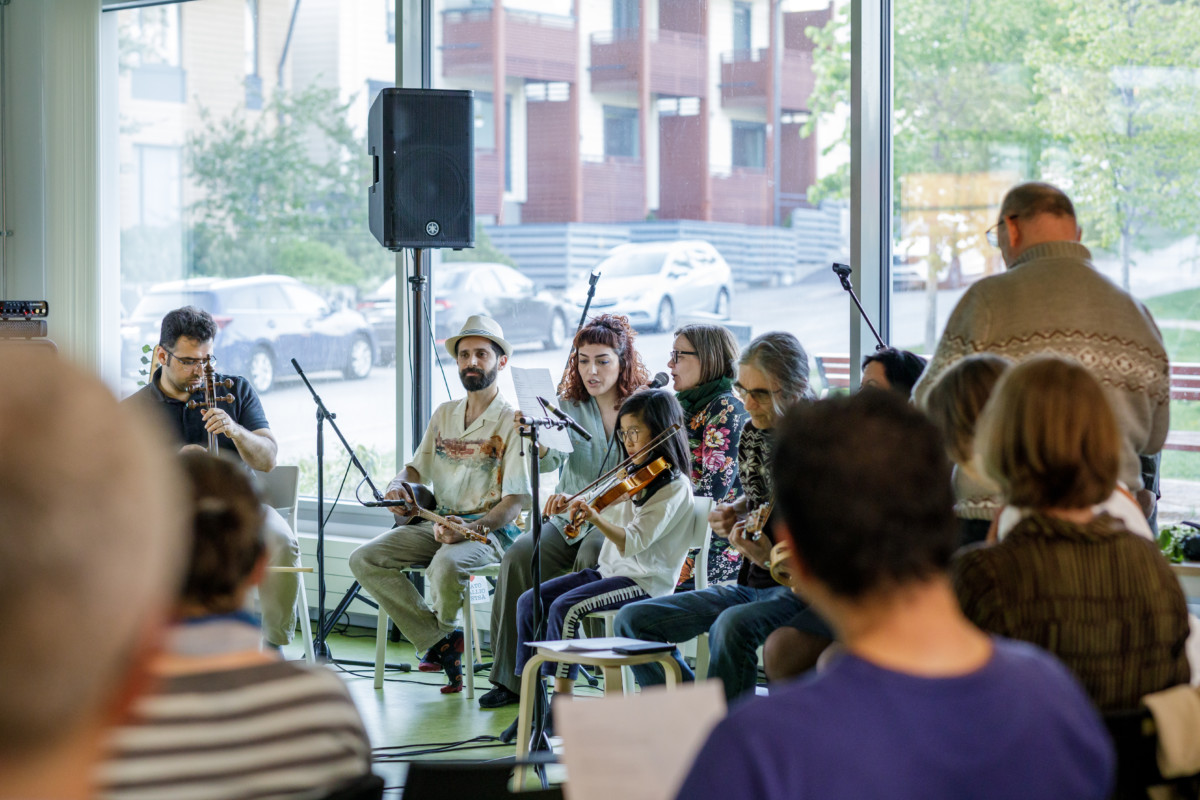
The title of the commission is a not-so-subtle reference to Chilean economists educated in the US to bring neoliberal economic policy back to Chile. Hiwa was inspired by the comparison between 1970s Chile and the Iraq War, drawing from David Harvey’s analysis on the topic. [iv] Hiwa’s extensive self-education is also practice-based, centered on the community development of a public space in his hometown of Sulaymaniyah. There he is developing permaculture farming practices and working together with local people to live in harmony with the environment. [v]
I first became familiar with Chicago Boys and Hiwa K during the last public rehearsal of the Helsinki iteration this summer. This rehearsal was preceded by a panel discussion, of which I was a member. The panel was asked where the soul of Helsinki could be found in a period where economic growth sits unquestioned.
At the time, I was wrapping up research on the overlapping and dissonant care practices of city planners, community space organizers, and artists in Helsinki. My answer positioned care practices as central to my understanding of the soul of the city: for me, the soul of Helsinki is not located, but enacted.
As a PhD researcher in the sustainability transformations field, I have come to challenge growth narratives in urban planning to shift towards care, joy, and collectivity. In the months since the panel, I found myself among colleagues and activists trying to enact these values.
Admittedly, it has been difficult to know where to start, and a process of learning by doing. Academic understanding of sustainability transformations suggests that we need a fundamental restructuring of socio-ecological and material-economic relations. Care practices are only beginning to enter these conversations seriously. During the public rehearsal, I saw that Chicago Boys is already putting care into transformative practice.
Caring together in public
There are many kinds of stories. Some stories position us in relation with other beings. Some stories were told to us, and we don’t know precisely where they came from. Some stories we tell together, resisting the temporalities of the individual and opening realms of collective imagination. Through these collective stories, it is possible to see that the way things are is not the way things have to be.
This is one of the contributions of Hiwa K and Chicago Boys. The rehearsals do not tell a unified, single story-as-truth. By gathering the shared multiple stories of participants, Chicago Boys connects what is unspeakable and creates spaces of possibility and hope.
Hiwa describes this space for bringing out unspeakable stories as a “platform where we learn from each other” about how neoliberalism has changed our lives. [vi] Without a barrier to entry to perform in the rehearsals, there were fewer boundaries between performer and audience member. All were able to share in a way that suited them. The intent to break barriers formed an intimate space for previously individual stories to come together.
Bringing the audience, or spectators, “onto the stage” is reminiscent of Augusto Boal’s concept of the spect-actor. A theatre practitioner, Boal coined the term as part of his performance method, blurring the boundary between actors and spectators, who are free to think and act for themselves. [vii] Even by exercising the freedom to not speak, sing, or play music, those who joined the Chicago Boys rehearsals were participating in a collective form. The participants had the freedom to care publicly, as a group.
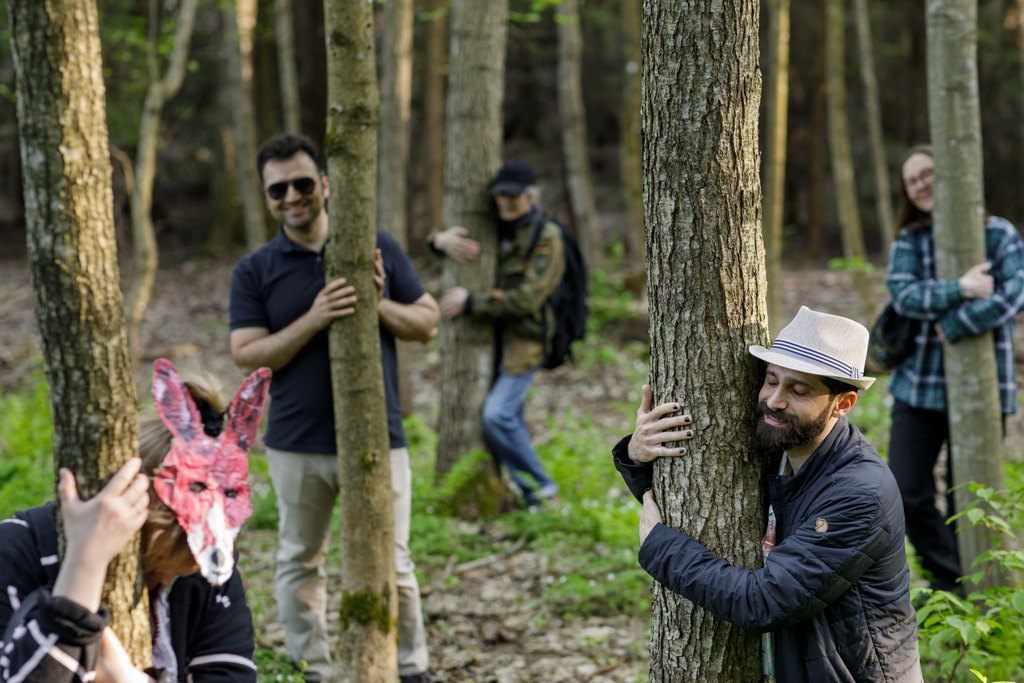
I mentioned that sustainability researchers are only beginning to understand the role of care in creating a desirable future. We often ask questions like, “how can we foster stewardship and environmental concern in the public?” I suspect we may be seeking answers to some of the wrong questions.
Chicago Boys managed to carve an answer to a different question in a perfectly unutterable way. One piece of audience feedback captures this predicament/possibility space:
“It immediately gave me the feeling that something is possible here and, at the same time, it’s like, how does this work, where are the instructions for use?” [viii]
The unutterability behind Chicago Boys lies in the impossibility of telling a story about how to care more.2 There is no roadmap for care practices based on embodied ways of knowing; we cannot read a story about care and replicate it. Care must be done to understand it.
Caring in public can be unnerving. Initially, it can feel like weakness to let one’s guard down in front of strangers. At first, my experience of caring in public during the final rehearsal was a feeling of exposure and discomfort in taking up space with my body and voice. I needed to release the tension of that exposure, so that I could be present with the others who were caring with me.
Care as activism
The Helsinki iteration of Chicago Boys links with current environmental activist discourses, giving voice to endangered mosses and those beings whose stories cannot be heard in human languages. The deep emotional and physical investment of activism is full with care, but this care can also give energy back to participants.
The fifth rehearsal took place in Matokallio forest, at the time a heavily contested site for an indoor speed-skating rink and carpark.[ix] Helsingin Sanomat framed the debate over the fate of Matokallio as “urheilijoiden ja luontoväen riitelyn kohde”: a fight between nature-lovers and athletes.[x] This is yet another story, one which might make people question why they should care about the removal of a single urban forest.
Recently it was announced that the site in Myllypuro is no longer under consideration for the ice rink, and new plans are being explored in Roihupelto.[xi] It seems that collective storytelling, in this case, may have aided in a possibility for a different future.
However, Helsinki is changing rapidly, and when one plan for development is put on hold another is already under way. The fourth rehearsal of Chicago Boys took place in Stansvik, an old forest containing endangered habitats protected by EU directive. During the rehearsals, it was noted that some of the trees are over 300 years old.[xii]
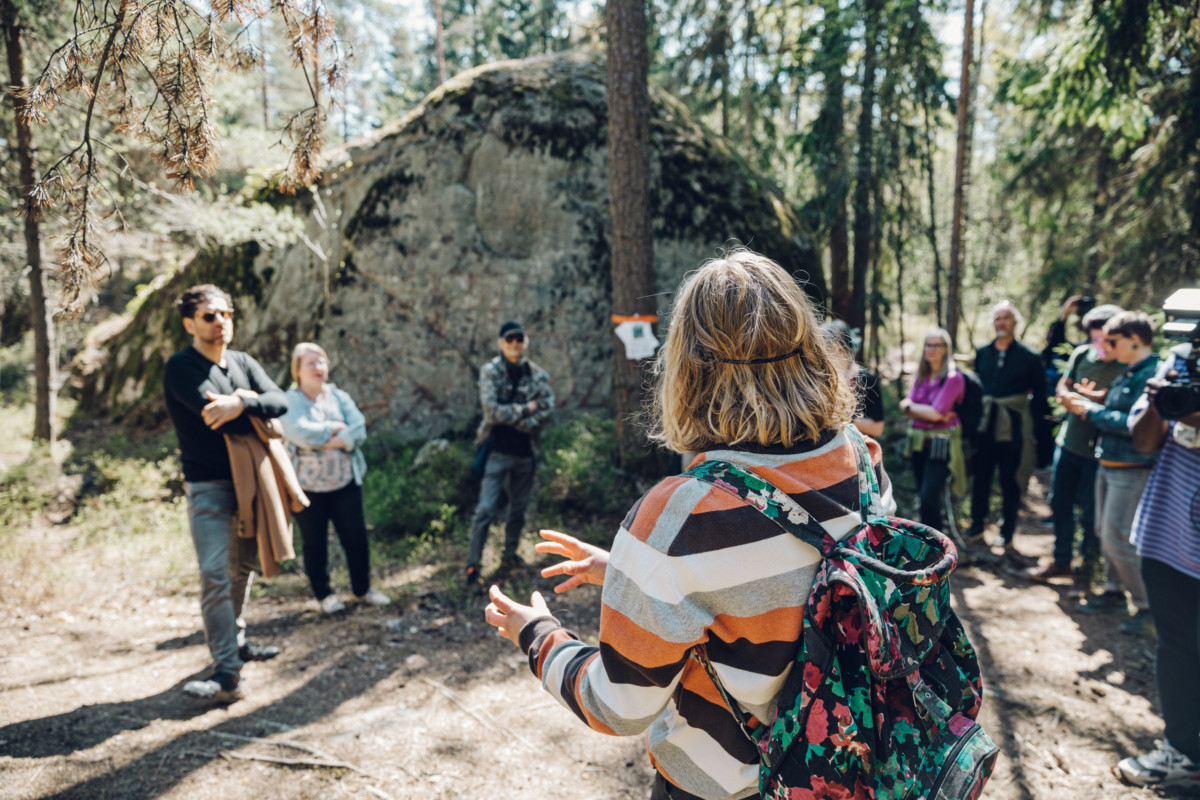
Readers may be aware of the ongoing removal of Stansvik’s old pine forest to make room for apartment buildings in Kruununvuorenranta. After month-long protests, logging, and arrests of protesters, cutting of the forest has been temporarily halted due to damage to a small, protected waterway nearby. At the time of this writing, it is not clear how long this cessation will continue[xiii], but the delay is a success in itself.
“Why should I care about this?”
It is a hard question to answer succinctly. It demands proof which can’t be explained well verbally. It is a question wrapped in stories of individualism, and these stories don’t want us to care beyond what can be transacted or paid for. Chicago Boys created a space for an answer to be seen, heard in song, and felt in the body. In creating that space, Chicago Boys also gave way for participants to feel ephemeral emotions “ranging from peace and melancholy, to discomfort, joy and warmth”.[xiv]
I suggest that the rehearsals gave participants an experience that required vulnerability in a form of activism, while supplying strength in collectivism. This is one of the many lasting impressions and accomplishments of the project. We can see that care is not a character in new collective stories. Care is done in telling the stories.
Activism, performance, academia, and life itself share a dynamic of vulnerability in exchange for collective energy. In this exchange, to care visibly and publicly may feel taboo, as if one is losing a part of oneself. This is an interesting tension which I suspect reveals that people do not exist despite our vulnerability; we exist interdependently with other beings, because we are vulnerable. It is okay to feel exposed in the telling of collective stories, and to feel some discomfort in activism, performance, and shared emotional experiences. It is also worthwhile to recognize that these feelings may come from stories that no longer serve us, and make space to tell new stories.
Sara Zaman
Doctoral researcher, University of Helsinki
_______________________________________
References:
[i] “IHME Helsinki Commission 2023 – Hiwa K: Chicago Boys”, YouTube-video, 28.9.2022, IHME Helsinki ‑YouTube channel, <https://www.youtube.com/watch?v=G0Y_L8dIdQs>.
[ii] Puig de la Bellacasa, Maria, Matters of care: Speculative ethics in more than human worlds, University of Minnesota Press, Minneapolis / Lontoo, 2017.
[iii] Haraway, Donna, Staying with the trouble: Making kin in the Chthulucene, Duke University Press, Durham / Lontoo, 2016.
[iv] Harvey, David, 2006, “Neo‐liberalism as creative destruction”, Geografiska Annaler: Series B, Human Geography 88, 2, 2006, 145–158, <https://doi.org/10.1111/j.0435-3684.2006.00211.x>.
[v] Mehta, Ali Akbar, “On Recognising the Moment of Hope: Speaking in Echoes With Hiwa K.”, NO NIIN, 15, 11/2021, <https://no-niin.com/issue-15/on-recognising-the-moment-of-hope-speaking-in-echoes-with-hiwa-k/>.
[vi] ”IHME Helsinki Podcast: Contemporary Art, Neoliberalism, Environmental Crisis”, podcast-ohjelma, 25.10.2023, IHME Helsinki Podcast, <https://www.helsinkiopenwaves.com/#/ihme-helsinki-podcast-contemporary-art-neoliberalism-environmental-crisis/>.
[vii] Boal, Augusto, Theatre of the Oppressed (1979), Pluto Press, Lontoo, 2008.
[viii] “What was the response to Chicago Boys – While We Were Singing, They Were Dreaming?”, online article, 27.6.2023, IHME Helsinki website, <https://ihmehelsinki.fi/en/news/what-was-the-response-to-chicago-boys-while-we-were-singing-they-were-dreaming/>.
[ix] Puig de la Bellacasa, Maria, Matters of care: Speculative ethics in more than human worlds, University of Minnesota Press, Minneapolis / Lontoo, 2017.
[x] “IHME Helsinki 2023 5/6: Matokallio”, online article, 26.5.2023, IHME Helsinki website, <https://ihmehelsinki.fi/en/news/ihme-helsinki-2023-5-6-matokallio/>.
[xi] Virtanen, Ari, “Helsinkiläisestä Matokalliosta tuli urheilijoiden ja luontoväen riitelyn kohde – tällaisesta paikasta on kyse”, online news, 1.2.2023, Helsingin Sanomat, <https://www.hs.fi/urheilu/art-2000009361547.html>.
[xii] Uusitupa, Ismo, “Yllätyskäänne: Helsingin luisteluareenalle löytyi täysin uusi paikka”, online news, 31.10.2023, Helsingin Sanomat, <https://www.hs.fi/urheilu/art-2000009959715.html>.
[xiii] “IHME Helsinki 2023 4/6: Stansvik forest and village”, online news, 19.5.2023, IHME Helsinki website, <https://ihmehelsinki.fi/en/news/ihme-helsinki-2023-4-6-stansvik-forest-and-village/>.
[xiv] “What was the response to Chicago Boys – While We Were Singing, They Were Dreaming?”, online article, 27.6.2023, IHME Helsinki website, <https://ihmehelsinki.fi/en/news/what-was-the-response-to-chicago-boys-while-we-were-singing-they-were-dreaming/>.
